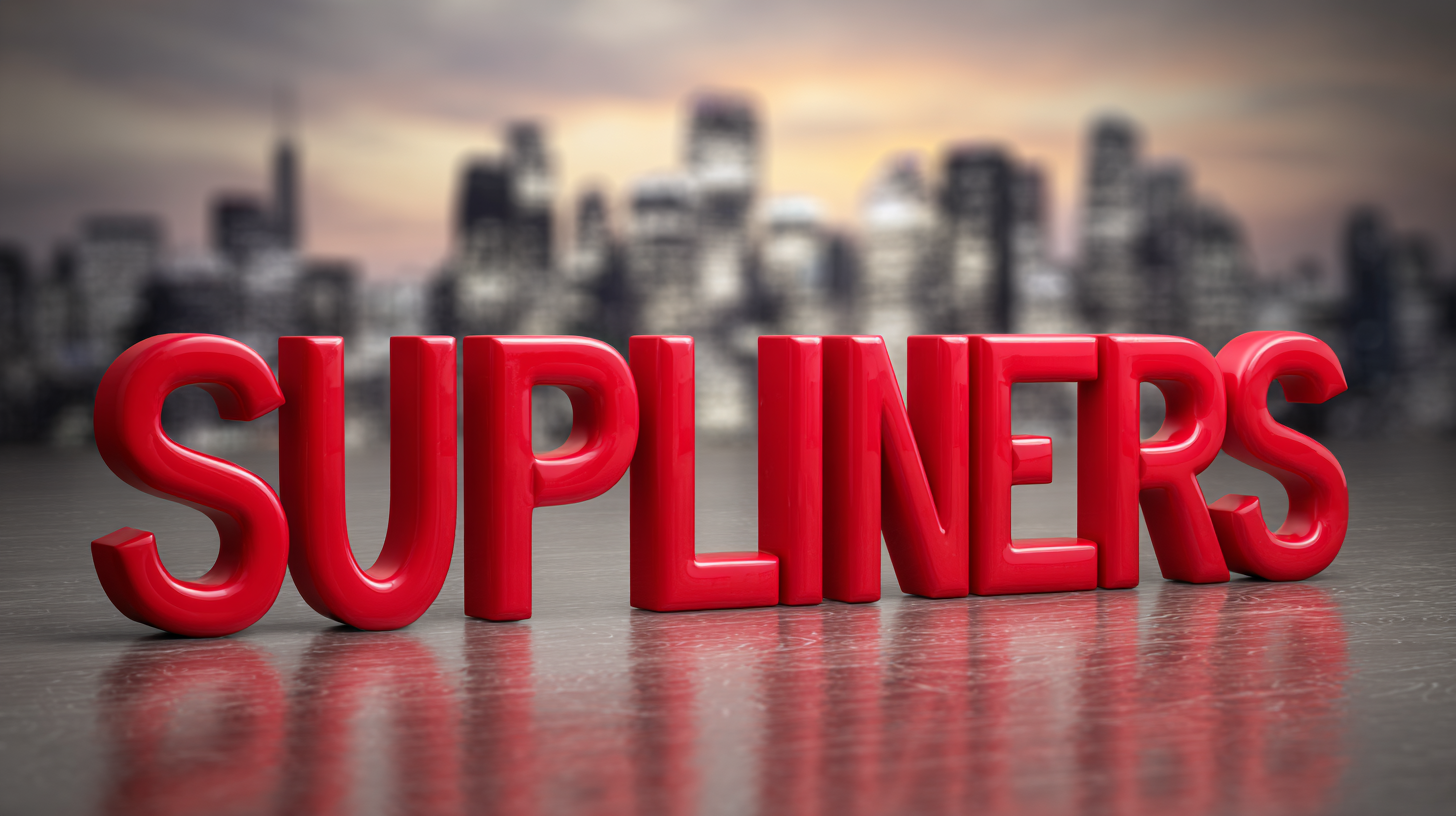


In today's highly competitive market, identifying the best suppliers is crucial for business success. According to industry reports, around 60% of a company's operational costs can be attributed to its suppliers, making their selection a vital component of overall strategy. A recent study revealed that businesses with strong supplier relationships report up to 20% higher profitability compared to their counterparts with weaker ties, highlighting the importance of strategic partnerships.

Furthermore, as supply chain disruptions have become increasingly common, ensuring that your suppliers are reliable and adaptable can significantly mitigate risks. With such compelling data underscoring the importance of choosing the right suppliers, it's essential to implement effective strategies for assessment and selection, ensuring that your business not only thrives but also remains resilient in the face of market challenges.
When identifying the best suppliers for your business, it is crucial to start by understanding your specific needs and defining key criteria. One essential factor to consider is
supply chain transparency, which has become increasingly important in today’s market. According to a recent McKinsey report, companies that prioritize transparency in their supply chains can achieve a
20% improvement in operational efficiency. By knowing where materials come from and how products are made, businesses can mitigate risks and foster trust with consumers.
Another critical criterion is
sustainability. With growing consumer awareness about environmental impacts,
66% of global consumers are willing to pay more for sustainable brands, as highlighted by Nielsen. Suppliers who implement sustainable practices not only enhance their reputational value but also align with the business goals of socially responsible organizations. Additionally, employing
Total Quality Management (TQM) principles can encourage continuous improvement throughout the supply chain, helping to prevent production errors and ensuring consistent quality that meets your business standards.
When it comes to finding the right suppliers for your business, the research phase is crucial. Start by leveraging online resources; platforms like industry-specific directories, trade associations, and business networks can be invaluable. Websites such as ThomasNet or Alibaba provide access to countless suppliers, allowing you to compare their offerings.
Additionally, attending trade shows or industry conferences can give you a firsthand look at potential suppliers and their products. These events facilitate direct interactions, enabling you to gauge their professionalism and reliability.
Once you've gathered a list of potential suppliers, the next step is to refine your shortlist. Look for reviews and testimonials from other businesses that have worked with these suppliers. This peer feedback can give you insight into their customer service and delivery timelines. Furthermore, consider reaching out for samples or trial orders. This will allow you to assess the quality of their products firsthand. By conducting thorough research and due diligence, you can ensure that the suppliers you choose will align with your business goals and contribute to your overall success.
Evaluating supplier reliability is crucial for businesses that aim for long-term success. According to a report by Deloitte, 67% of companies consider supplier performance as a key driver of operational excellence. Reliability encompasses both trustworthiness and consistent performance, which directly influence your supply chain effectiveness. A reliable supplier should not only meet delivery timelines but also maintain quality standards, minimizing disruptions that can cost your business significantly. The same report indicates that a single supply chain disruption can lead to an average revenue loss of 15% for affected businesses.
To assess a supplier's trustworthiness, you can leverage data sources like Dun & Bradstreet, which provide insights into a supplier’s creditworthiness and business history. Coupled with performance metrics such as on-time delivery rates and quality assurance reports, these evaluations help create a clear picture of a supplier's capability. Furthermore, a 2020 study by McKinsey highlights that 53% of executives believe that assessing supplier performance is paramount to reducing risk and driving profitability. By prioritizing these evaluations, businesses can build a robust supplier network that enhances overall success and resilience.

 Building strong relationships with suppliers is crucial for business success, and effective communication plays a key role in fostering these partnerships. According to a study by the Institute for Supply Management, companies that prioritize supplier engagement are 25% more likely to succeed in achieving their key objectives. To ensure open communication, businesses should adopt a collaborative approach that encourages transparency and feedback.
Regular meetings, either in-person or virtual, can help align goals and expectations, thereby reducing misunderstandings and building trust.
Building strong relationships with suppliers is crucial for business success, and effective communication plays a key role in fostering these partnerships. According to a study by the Institute for Supply Management, companies that prioritize supplier engagement are 25% more likely to succeed in achieving their key objectives. To ensure open communication, businesses should adopt a collaborative approach that encourages transparency and feedback.
Regular meetings, either in-person or virtual, can help align goals and expectations, thereby reducing misunderstandings and building trust.
Additionally, implementing technology solutions such as Supplier Relationship Management (SRM) systems can streamline communication processes. A report from Deloitte found that 60% of high-performing companies utilize these systems, resulting in improved supplier performance and innovation. By sharing data and insights through these platforms, businesses can foster a sense of partnership, enabling both parties to react more swiftly to market changes. Ultimately, nurturing effective communication and collaboration can lead to a more resilient supply chain and greater overall business success.
Negotiating terms and contracts is a crucial step in establishing a successful partnership with suppliers. Effective negotiations can lead to mutually beneficial agreements that foster long-term business relationships. According to a report by Deloitte, organizations with strong negotiation practices achieve 25% better financial outcomes compared to their competitors. Clear communication and thorough understanding of contract terms are essential to ensure fairness and clarity.
When negotiating, it’s vital to prioritize transparency. Begin discussions by clearly stating your expectations and understanding the supplier's capabilities. A well-defined scope of work can mitigate misunderstandings later on. Additionally, consider incorporating performance metrics within the contract to foster accountability. As highlighted in a McKinsey study, businesses that implement clear performance indicators in contracts see a 30% increase in supplier compliance.
In addition, don’t hesitate to explore and compare terms across multiple suppliers. This approach not only empowers you to negotiate better conditions but also serves as leverage in discussions. Remember to pay attention to the pricing structure, payment terms, and delivery schedules. Having historical data from industry studies can help substantiate your position during negotiations, ensuring you secure the best possible agreement for your business.
| Supplier Criteria | Rating (1-5) | Pricing Transparency | Contractual Flexibility | Delivery Reliability |
|---|---|---|---|---|
| Quality of Products | 4 | Yes | High | 95% |
| Customer Service | 5 | Yes | Moderate | 90% |
| Ethical Standards | 4 | Yes | High | 88% |
| Product Range | 3 | No | Low | 85% |
| Financial Stability | 4 | Yes | Moderate | 92% |